In the briefing with the APA co-chairs, Sara referenced “the dreaded drafting exercise.” I left that briefing to go listen in on some detailed negotiation around bracketed text about the GCF.
The session had started as a closed “inf inf” (informal informal, as opposed to an informal, which is sometimes open, or a contact group) but it had been opened at the suggestion of the AGN (Africa Group of Nations).
The text under discussion is projected on screens in the middle of the square of tables, and also at the sides of the room:
I arrived just in time to hear the start of some horse-trading. These notes are scrappy because it’s hard to grasp all the references and undercurrents. The discussion was focused on paragraph 6 of the document in question. My somewhat facetious translations are in brackets.
SOUTH AFRICA (speaking for African Group of Nations; delegations tip their name cards on end to show their desire to speak)
We retained the right to bring back the brackets of paragraphs 3 and 4 if our negotiating partners are not willing to consider the issues here. (If you all want to make progress more generally, give me some agreement here.)
NORWAY
It is important that when we are uncovering text that we should aim for harmonization. (Uncovering text = removing brackets. We have to bear in mind the work of other groups, too.)
CoCHAIR
Suggestions that there was better language than what we have here… [long whispered conversation with co-chair and secretary] We understand the concerns of each of you. I was very happy with the proposal brought by Norway.
Three agenda items (two discussed other negotiating groups) focus on the same issue. Therefore the language used here might be useful. In moving forward, we request Canada to work with Africa on the very correct language we think would be useful to use move forward. We are bombarding with you (Africa) with a lot of admin, but this is extremely important for you as you have said. (Can we take this out of committee, please, and let the opponents tackle the issue directly?)
SOUTH AFRICA
We need to have this discussion in public, so that we understand why Australia, Canada, Switzerland have spoken out against the language. We agree with Norway that there is a need for coherence. I am late for a HODs (heads of delegation meeting). We are not suggesting three different paragraphs. What we have here is a very specific mandate: we would like to see mandate acted upon….
We are willing to have a conversation with parties about this agreed language, why our partners have such opposition to this agreed language. It is very difficult to engage with lots of silence in this room. (JUSCANZ is obstructing progress and not acknowledging their bad behavior.)
USA
We are concerned about the characterization that we are trying not to follow the language. The language is improperly constructing bodies. This needs to be solved at a higher level. Nobody is saying let’s not address it, but let’s not give instruction to the SCF (Standing Committee on Finance). (Unfair! We’re just saying it’s not our job to tell the SCF what to do.)
CoCHAIR
Everyone wants to operationalize. This is just a matter of clarifying some of guidance. We reiterate our request to our three colleagues. We hear Norway, repeated by the US now—it’s a matter of getting language in best places: where it falls, how we give the guidance. We request once again to see if you can sit and get better language than that, if you agree. If you don’t agree, we will bracket paragraphs 3 and 4. (Can you please work this out over lunch?!)
SOUTH AFRICA
It’s maybe better if you and Stefan (other co-chair) meet with acf and ltf (? chairs of other committees), just the four of you and you bring us a proposal. You understand the issues from this group; we are ready to be consulted by the four of you. I think it’s better that it sits somewhere else. (Africa is telling the chair what to do. Whoa. Also saying, it’s not going to be productive to try to solve this among ourselves over lunch–and besides, I have this other meeting.)
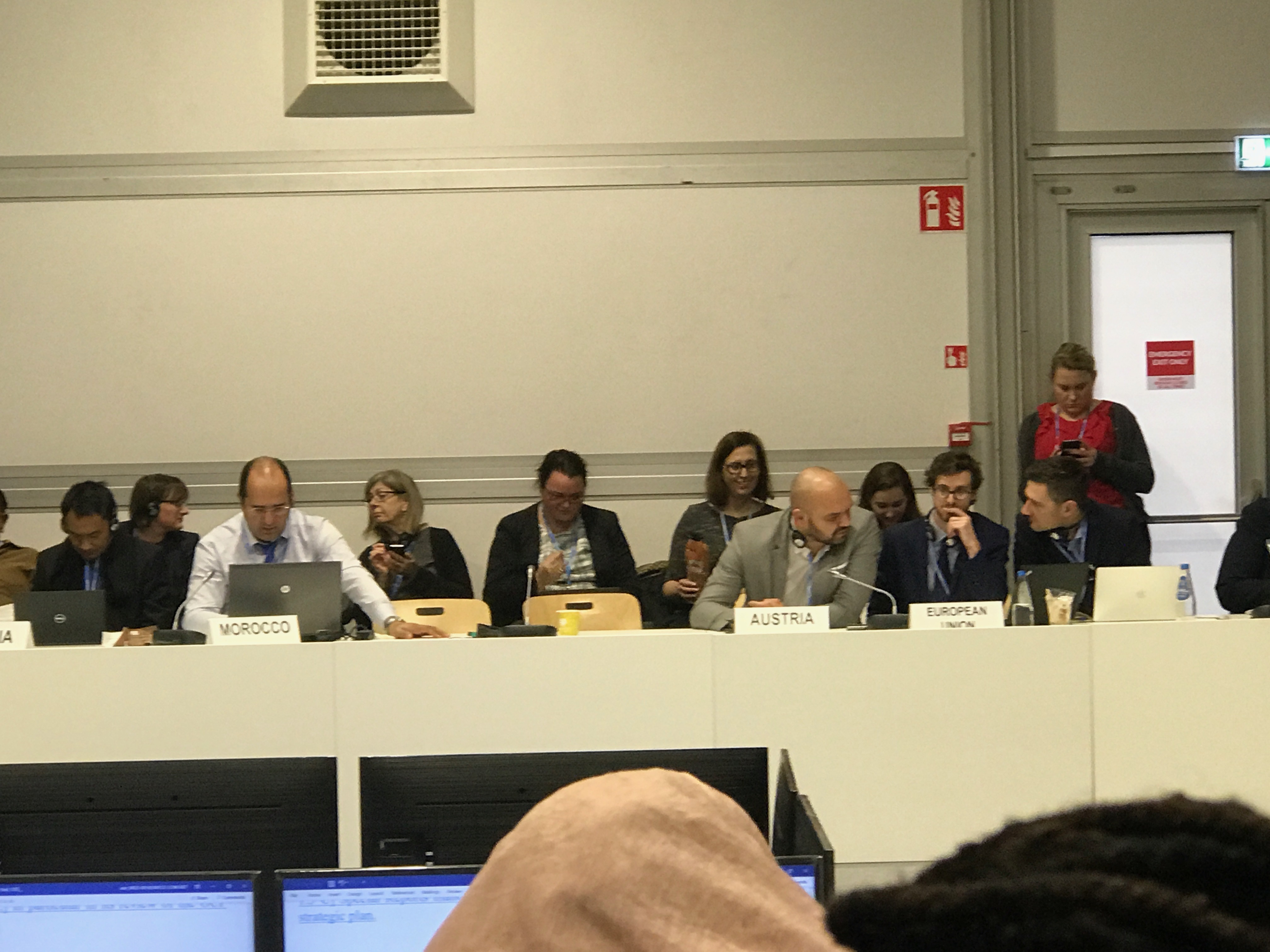 EU
EU
This is an interesting [?]. We would like to suggest a gentleman’s agreement that if an interesting proposal comes out of this, that we agree to move forward. (Africa is the one being an obstacle here: can we agree to a limit on how much more of this will happen?)
SOUTH AFRICA
We want to clarify for our friends in the EU that we have no substantive disagreement to ¶4. We think it’s important to stop unilateral veto power of some parties moving forward. (I think this is aimed at the US and its power to block funding to states it considers enemies or invalid actors. In other words, let us remind you that we are not the bad guys here.)
CoCHAIR
Let us move to paragraph 10.
USA
For the US, this tone is unacceptable. We suggest changing “urges” to “invites.” (The US doesn’t like any language that suggests constraint on national sovereignty.)
CoCHAIR
Is this acceptable?
SOUTH AFRICA
We’ll have to come back to you.
CoCHAIR (looking around)
The rest of us accept. Africa?
PAKISTAN
Our preference would be to remain with the existing language.
CoCHAIR
OK, you can join the party.
BHUTAN
The current language emphasizes the urgency of the situation. This seems appropriate.
CoCHAIR (after more whispered consultation)
We have in principle agreed everything except two paragraphs in brackets. On paragraph 6 we will consult with co-chairs of other agenda items between 1 & 2 pm with colleagues in room 22. We will invite some of you. On paragraph 10 we invited 4 parties (US, South Africa, Bhutan, Pakistan) to come up with agreed language. If we have no agreement on ¶6, we will have to bracket 3 and 4.
SOUTH AFRICA
At COP22 the same language (in paragraph 10) was agreed: the situation has not changed since Marrakech.
LIBERIA
Those who haven’t come through with first pledges, we urge them to do so.
CoCHAIR
We have to end here.
*************
After lunch and a meeting on GEF guidance (see other post), the GCF guidance discussion picked up again:
The Secretariat passed out a three-page document for consideration (to everyone in the room, even observers). See below.
EU
What text are we considering, precisely: new text on the screens or the paper version?
CHAIR
What is in front of you.
(There is some general muttering.)
SOUTH AFRICA (picking up on the discontent)
We said that we would go back to bracketing 3 and 4 if…
CHAIR
So let us begin with…
EU (picking up name card and banging hand on it as a means of interrupting the Chair)
Richard, WHEN did you propose to go and develop something? It was when we were not in the room. (Ooh, he’s mad. Interrupting the chair and calling another party out by first name. Breach of decorum.)
CHAIR
This was not the intent but it was a request for the African Group to develop a compromise.
(The Chair has “the power of the pen:” by asking AGN to develop new text, he may have leapfrogged over what others consider an acceptable process.)
NORWAY
With these two paragraphs I really have trouble understanding why these should have been part of GCF guidance. I can’t see why we are discussing them in this room. Perhaps not everyone in this room is aware of the language in the Standing Committee on Finance (and then she read it out–I couldn’t keep up): the SCR (Standing Committee on Finance) ¶10 also requests in collaboration with [someone] to explore ways and means either to assess the needs of developing countries or assist developing countries in assessing their needs and priorities …adaptation…
I do not think that these two alternative ¶s will be acceptable in this guidance: they would not be accepted by people working on guidance for the SCF.
SOUTH AFRICA
Responding to something that you don’t know the context of is often unproductive. In this regard, it is unfortunate that Norway launched into this issue.
We are back to where we left off, with brackets on 3 and 4.
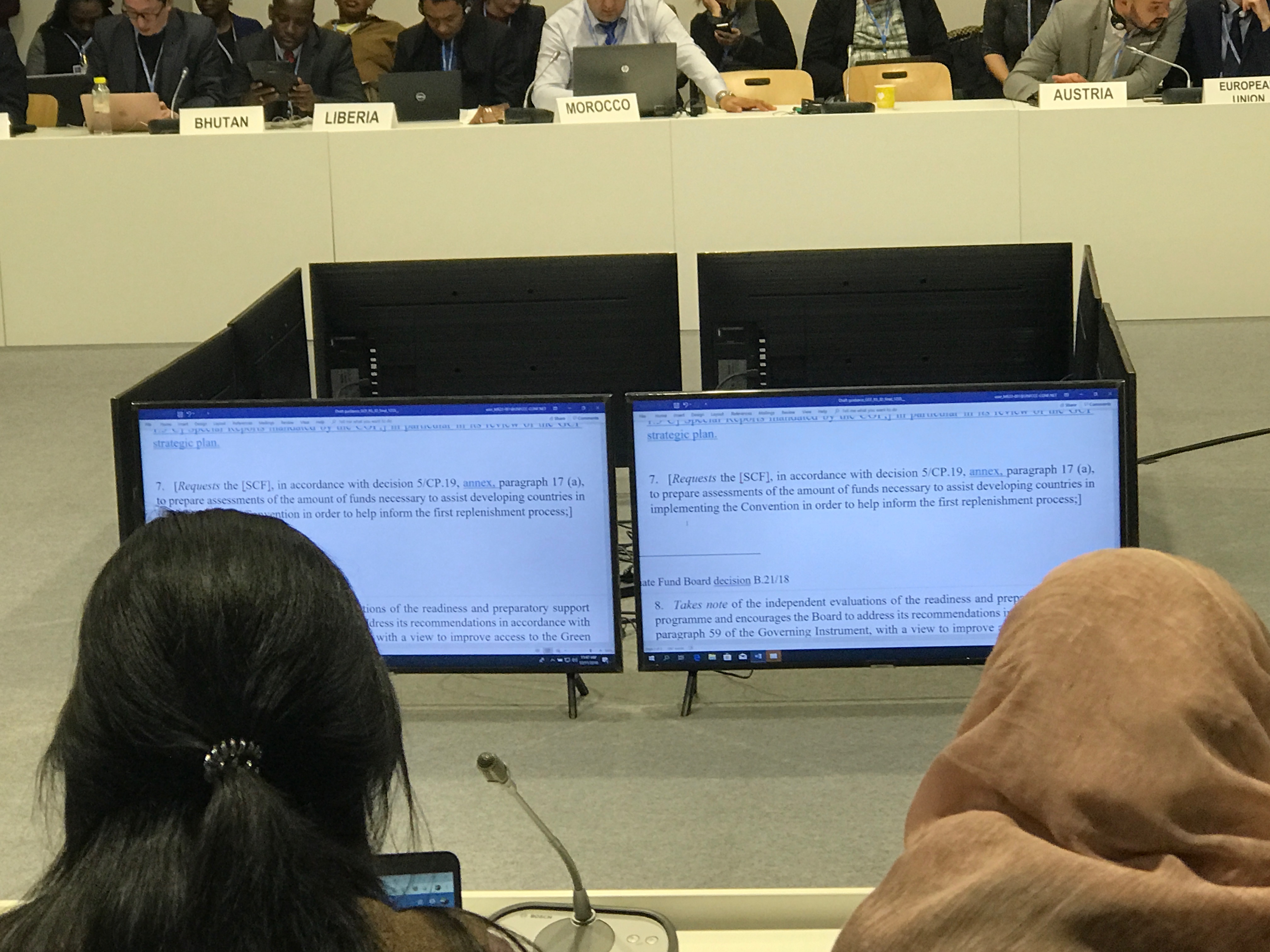
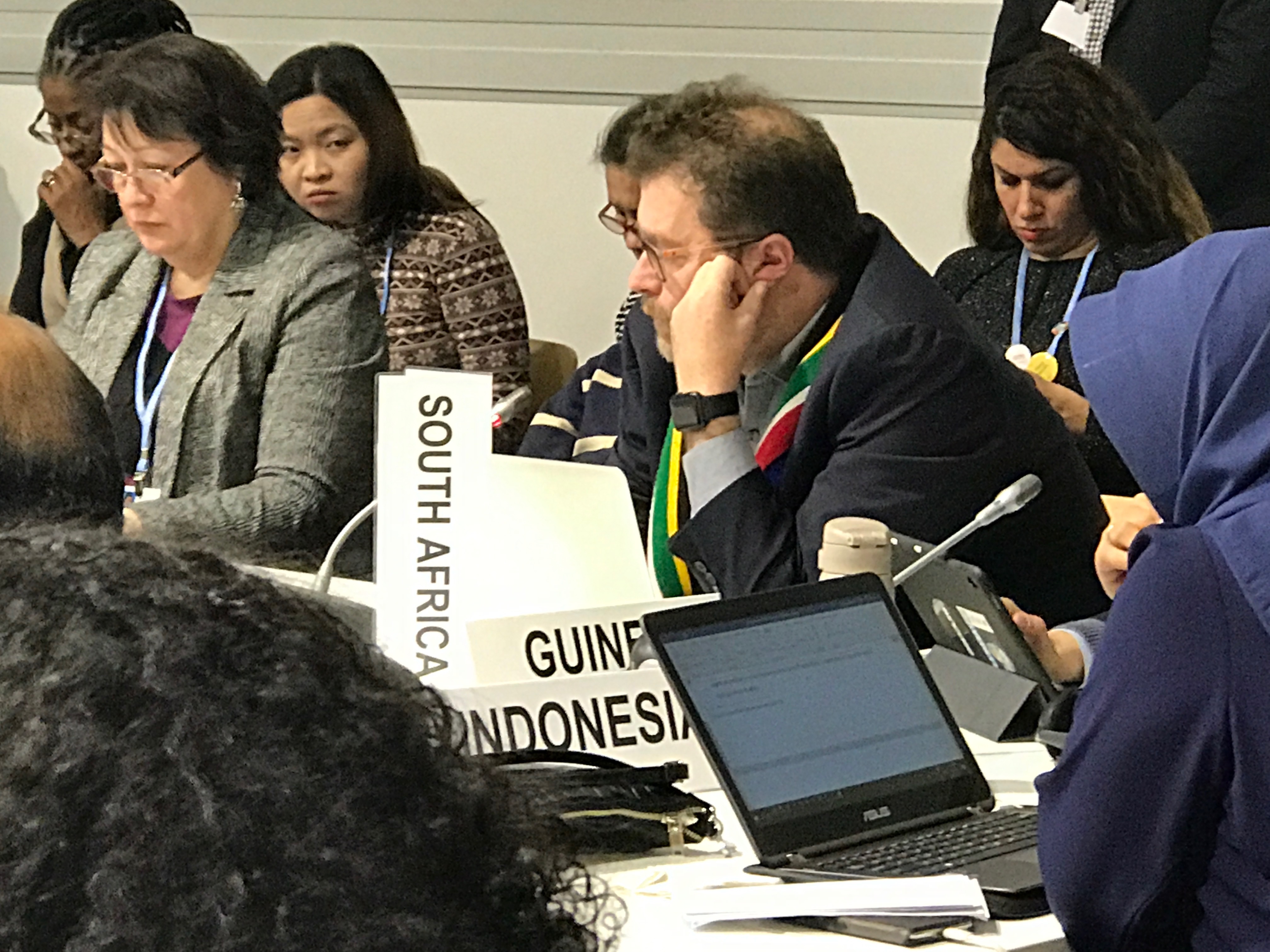

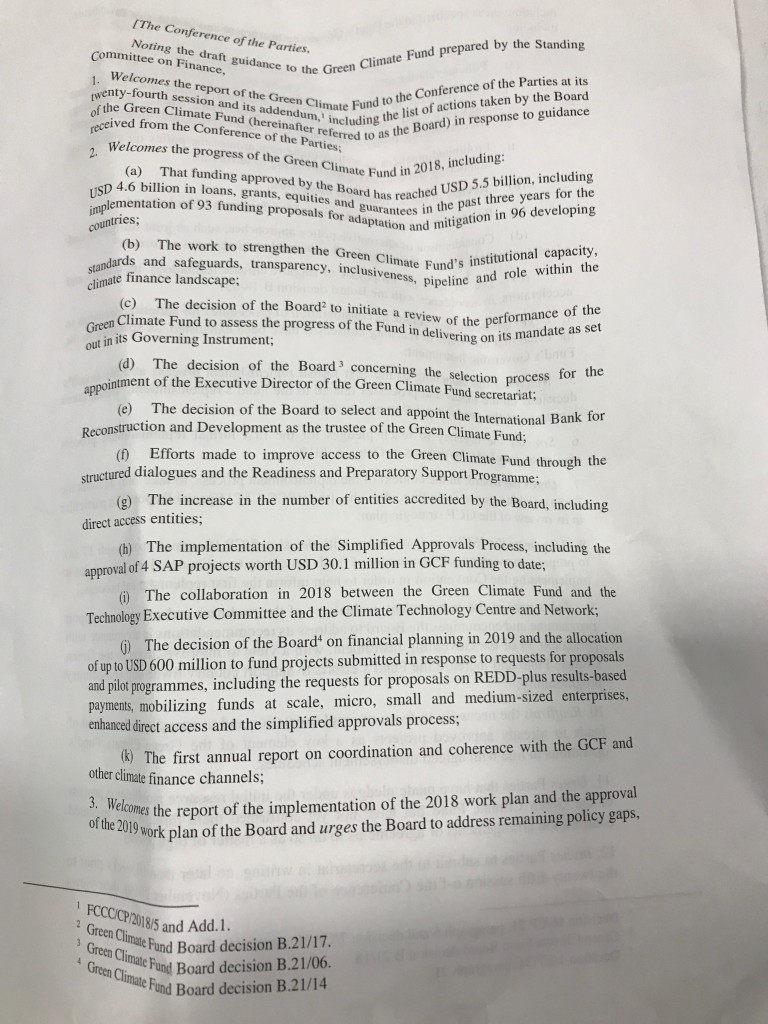
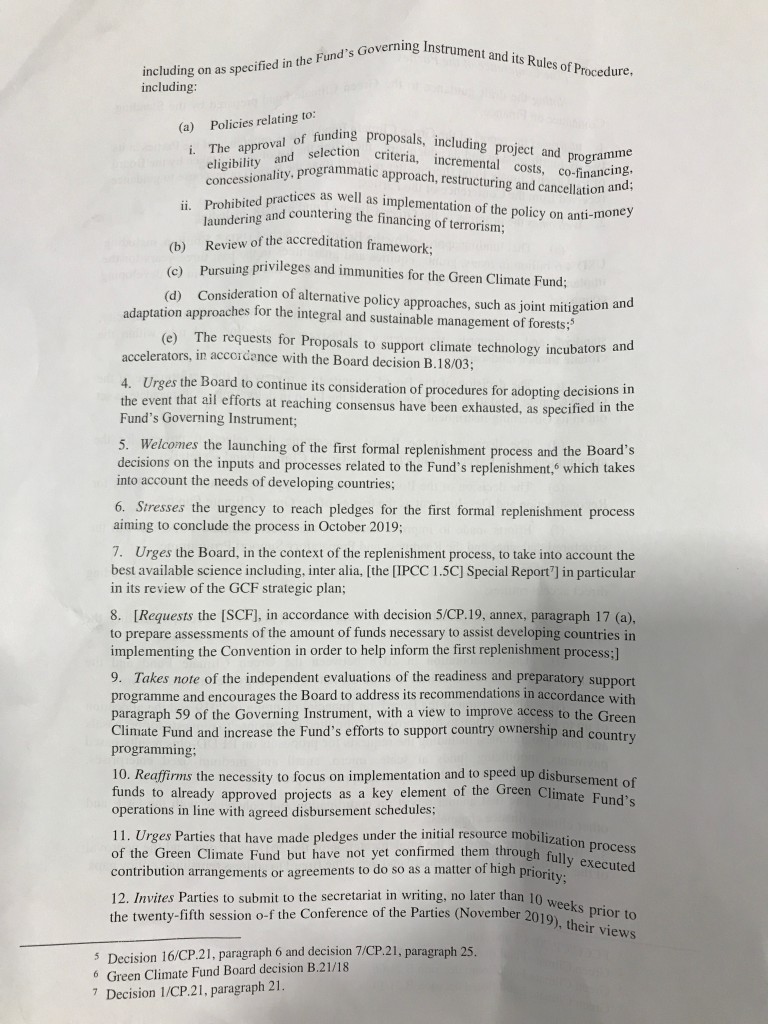
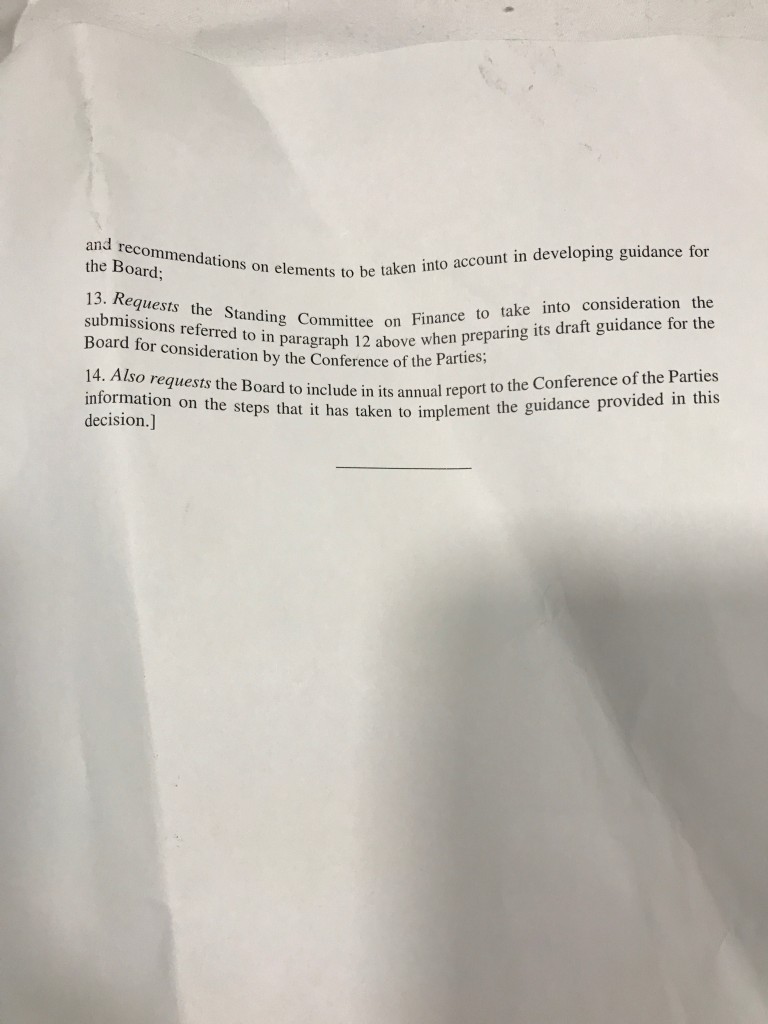
I am a sixth grade student at Media Providence Friends School.
I am very interested in how countries are working with each other to solve problems effecting our Earth. To me this is a good way to restore our Earth (including animals, plants and other organisms that are Biotic) making this a good effort in restoring the Earth.
Hi Parker,
Thanks so much for the comment. What did you think of the conversations these countries were having? I was interested in the ways that negotiators had to speak very indirectly. I think they’re not supposed to use any names–it’s as if the person doing the negotiating is erased and replaced by the role of representing the country. And yet the personality and skill of the individual negotiator also seems very important to the outcome of these discussions. And there’s this back-story that informs the conversation, but no one discusses it directly. The US administration is very anti-Iran, and this negotiation is Iran’s best chance to crack open some funding opportunities–but Iran just talks about “other processes” and general needs for “developing countries” to be able to access environmental finance. The Talanoa Dialogue–introduced by Fiji–was an attempt to move beyond this kind of indirect, hidden, maneuvering kind of communication, but the COP Secretariat doesn’t seem to have been able to figure out how to integrate that more open communication into the negotiations. It’s all pretty fascinating to me.